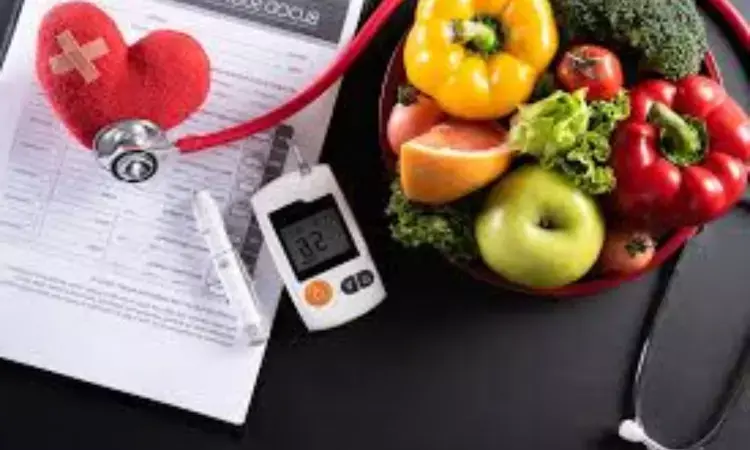- Home
- Medical news & Guidelines
- Anesthesiology
- Cardiology and CTVS
- Critical Care
- Dentistry
- Dermatology
- Diabetes and Endocrinology
- ENT
- Gastroenterology
- Medicine
- Nephrology
- Neurology
- Obstretics-Gynaecology
- Oncology
- Ophthalmology
- Orthopaedics
- Pediatrics-Neonatology
- Psychiatry
- Pulmonology
- Radiology
- Surgery
- Urology
- Laboratory Medicine
- Diet
- Nursing
- Paramedical
- Physiotherapy
- Health news
- Fact Check
- Bone Health Fact Check
- Brain Health Fact Check
- Cancer Related Fact Check
- Child Care Fact Check
- Dental and oral health fact check
- Diabetes and metabolic health fact check
- Diet and Nutrition Fact Check
- Eye and ENT Care Fact Check
- Fitness fact check
- Gut health fact check
- Heart health fact check
- Kidney health fact check
- Medical education fact check
- Men's health fact check
- Respiratory fact check
- Skin and hair care fact check
- Vaccine and Immunization fact check
- Women's health fact check
- AYUSH
- State News
- Andaman and Nicobar Islands
- Andhra Pradesh
- Arunachal Pradesh
- Assam
- Bihar
- Chandigarh
- Chattisgarh
- Dadra and Nagar Haveli
- Daman and Diu
- Delhi
- Goa
- Gujarat
- Haryana
- Himachal Pradesh
- Jammu & Kashmir
- Jharkhand
- Karnataka
- Kerala
- Ladakh
- Lakshadweep
- Madhya Pradesh
- Maharashtra
- Manipur
- Meghalaya
- Mizoram
- Nagaland
- Odisha
- Puducherry
- Punjab
- Rajasthan
- Sikkim
- Tamil Nadu
- Telangana
- Tripura
- Uttar Pradesh
- Uttrakhand
- West Bengal
- Medical Education
- Industry
Hypertension and hyperglycemia additively increase CVD risk, relative contribution attenuated in presence of either: JAHA

Japan: Hypertension and hyperglycemia additively increase the risk of cardiovascular disease (CVD) development, according to an analysis of a large‐scale, real‐world database comprising more than 3 million adults without prior CVD history. However, the relative contribution of hypertension to CVD development decreased with worsening blood sugar status and that of hyperglycemia attenuated with increasing blood pressure (BP).
"Our results (published in Journal of the American Heart Association) suggest a potential interaction between hyperglycemia (increased blood sugar levels) and hypertension (increased BP) in the development of cardiovascular disease," Hidehiro Kaneko from The University of Tokyo in Tokyo, Japan, and colleagues wrote in their study. The preventive efforts for hyperglycemia or hypertension could provide a more significant benefit before their coexistence.
Hyperglycemia and hypertension both increase the risk of CVD development and frequently coexist. However, not much is known about the interaction between hyperglycemia and high BP in the development of CVD. To fill this knowledge gap, the research team aimed to determine (1) whether hyperglycemia (prediabetes and diabetes) and hypertension (stage 1 and stage 2 hypertension) additively increased the risk of CVD development, including angina pectoris (AP), myocardial infarction (MI), heart failure (HF), stroke, and atrial fibrillation (AF) and (2) whether the contributions of hyperglycemia and hypertension to the risk of CVD development interact with each other.
For this purpose, the researchers conducted an observational cohort study using a large‐scale health checkup and administrative claims data set. The study included 3 336 363 patients (median age, 43 years old; men, 57.2%). Patients taking BP, glucose-lowering medications, or those with prior CVD were excluded.
Stage 1 hypertension was defined as SBP (systolic blood pressure) of 130 to 139 mm Hg or diastolic BP (DBP) of 80 to 89 mm Hg, and stage 2 hypertension as SBP of ≥140 mm Hg or DBP of ≥90 mm Hg. Prediabetes was defined as fasting plasma glucose of 100 to 125 mg/dL and diabetes as fasting plasma glucose of ≥126 mg/dL.
The authors reported the following findings:
- Five thousand six hundred sixty-five myocardial infarctions, 52 475 angina pectoris, 54 508 heart failure, 25 436 stroke, and 12 932 atrial fibrillation events occurred over a mean follow‐up period of 1185 ± 942 days.
- The BP and fasting plasma glucose categories increased the risk of angina pectoris, myocardial infarction, heart failure, stroke, and atrial fibrillation.
- The relative risk of stage 1 and 2 hypertension developing into CVD was attenuated with worsening glycemic status. Similarly, the relative risk of diabetes and prediabetes developing into CVD was attenuated with increasing blood pressure. For example, the relative risk reduction of stage 2 hypertension for heart failure was 53.5% in patients with normal fasting plasma glucose, 46.4% in patients with prediabetes, and 37.2% in those with diabetes.
- The robustness of the findings was confirmed using a multitude of sensitivity analyses.
"Hyperglycemia and stage 1 and 2 hypertension additively increase the risk of cardiovascular events," the study stated. "However, the relative risk reduction of hypertension for CV events attenuated with worsening glycemic status. Similarly, the relative association of diabetes and prediabetes with the incidence of CVD also attenuated with increasing BP."
Reference:
Suzuki Y, Kaneko H, Yano Y, Okada A, Itoh H, Matsuoka S, Yokota I, Imaizumi T, Fujiu K, Michihata N, Jo T, Takeda N, Morita H, Node K, Yasunaga H, Komuro I. Interaction of Blood Pressure and Glycemic Status in Developing Cardiovascular Disease: Analysis of a Nationwide Real-World Database. J Am Heart Assoc. 2022 Dec 24:e026192. doi: 10.1161/JAHA.122.026192. Epub ahead of print. PMID: 36565182.
Dr Kamal Kant Kohli-MBBS, DTCD- a chest specialist with more than 30 years of practice and a flair for writing clinical articles, Dr Kamal Kant Kohli joined Medical Dialogues as a Chief Editor of Medical News. Besides writing articles, as an editor, he proofreads and verifies all the medical content published on Medical Dialogues including those coming from journals, studies,medical conferences,guidelines etc. Email: drkohli@medicaldialogues.in. Contact no. 011-43720751


